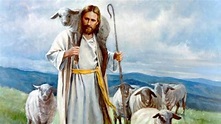

Most people who have been exposed to the Bible even a little know that David was a shepherd in Bethlehem as a young boy before becoming Israel's greatest King. David's Psalm 23 is often recited by believers and outsiders alike,
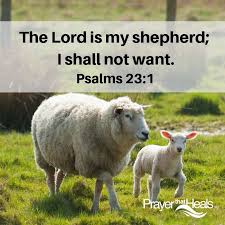
The figure of shepherd-king is especially suited to the agrarian society of ancient Israel. The land--with its Mediterranean Dry climate (like California)--has lots of rocky hills, but is well suited for olive trees, vineyards, fruit trees, and the grazing of sheep, goats and cattle. The Philistines had bronze and iron, the Egyptians had horses and chariots, but the Israelites fought on foot with simple spears, borrowed farm implements, or a simple sling. Their strength was always to be found in the Yahweh their God. They were not to enter into entangling foreign alliances of any kind.
The first indication that the God of Israel is a shepherd to His people Israel is found in Jacob's words of farewell blessing to his sons in Genesis 48. Jacob, Abraham's grandson, spoke of "the God before whom my fathers Abraham and Isaac walked, the God who has been my shepherd all my life to this day, the Angel who has delivered me from all harm..." (15-16 NIV)
James Boice notes,
This is a powerful statement. But it seems to be an understatement as a description of the difficulty of a shepherd's life. Sheep are notoriously helpless, wayward, and even stupid animals, and it is a difficult and full-time job to care for them."The reason this is so helpful is that Jacob had been a shepherd himself, and he knew from experience how difficult a shepherd's work was. In his moving confrontation with Laban, after Laban had pursued him on his flight from Haran back to his own country, Jacob aptly described the difficulties of a shepherd's life, saying, "This was my situation: The heat consumed me in the daytime and the cold at night, and sleep fled from my eyes. It was like this for the twenty years I was in your household...If the God of my father, the God of Abraham and the Fear of Isaac, had not been with me, you would surely have sent me away empty-handed" (Genesis 31:40-42).
Jacob had also learned a second thing about shepherding, and that was how great a failure he had been when he was trying to shepherd himself. Self-shepherding means trying to run your own life. Jacob was like many Christians today. He acknowledged God. He would have described himself as a believer. But he had followed his own judgment and taken his own paths rather than trusting in the word and wisdom of the divine shepherd. The wonderful thing is that, in spite of Jacob's waywardness. God had been a faithful shepherd to Jacob anyway, which he acknowledges, just as God also is to us." (Psalm 80, Psalms, Baker Books, 1996)
The Old Testament is surely more relevant today than when it was written. Yet American Christians are generally biblically illiterate these days. Most churches seem to have wandered off onto irrelevant pathways having detached themselves from much of what God is really doing in history. But dare to pick up the Old Testament and read awhile and surely the words will begin to leap off the page--especially if one follows the latest news from the Middle East. The Second Advent of Jesus is "nearer now than when we first believed"--and the Bible is packed full of details concerning the end of the age we live in.
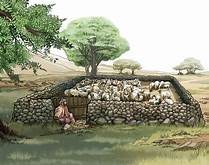
When Jesus is described as the Shepherd-King in Scripture the emphasis is first of all about his relationship with Israel. To be sure Jesus is the Shepherd of all his people whether they are members of the believing remnant of Israel, or Christians. Jesus spoke of this in John 10:
"I am the good shepherd; and I know My sheep, and am known by My own. "As the Father knows Me, even so I know the Father; and I lay down My life for the sheep. "And other sheep I have which are not of this fold; them also I must bring, and they will hear My voice; and there will be one flock and one shepherd." (John 10:14-16)
Ray Stedman says,
The first thing in his work as the Great Shepherd is that he has "other sheep that are not of this fold." The fold he speaks of is the nation Israel. Here Jesus is lifting his eyes beyond the cross, beyond the resurrection, to the going forth of the gospel to all the nations of the earth. Isn't it moving to think that not one of us would be here this morning, as Gentile believers in Jesus, if he had not been willing to lay down his life for the sheep. The result of that laying down of his life was that the gospel broke out beyond the boundaries of Israel and spread throughout the earth. Here we are, at the far corners of the world, meeting as a great crowd of believers in Jesus because he laid down his life for the sheep. He brought us together so that there is one flock -- not one fold, notice, but one flock-- and one shepherd, no more than one; one church, one Lord, as Paul says in Ephesians 4. We all belong together. There are not two flocks; there is only one...
Surely one of the most meaningful aspects to believers about Jesus is that he does for us what no one else can do. Do you feel that? No one else can satisfy your heart, no one else can solve the problems of the mind, no one can answer the questions about life after death like Jesus can. No one can touch a human situation of conflict and strife and bring healing and deliverance like Jesus can. Don't you often feel like saying, with Peter, "To whom can we go? You alone have the words of eternal life," (John 6:68 RSV). From The Shepherd and His Sheep.
The
New Testament spiritual gift of pastor (poimen) is that of a shepherd
in the local church, (see Body Life by Ray Stedman),
though many pastors today are isolated and insulated from the people they are
supposed to serve.
Peter admonishes, "Shepherd the flock of God which is among you, serving as overseers, not by compulsion but willingly, not for dishonest gain but eagerly; nor as being lords over those entrusted to you, but being examples to the flock; and when the Chief Shepherd appears, you will receive the crown of glory that does not fade away." (2 Peter 5:2-4).
While the theme of the shepherd and his sheep is not a major subject of the New Testament--it is a big deal in the Old Testament. The Tanach is loaded with powerful references to Israel's Messiah and His role as coming Shepherd-King of Israel.
Psalm 80 is vividly clear on this subject. The writer is Asaph, a Levite and leader in the temple choir in David's time. Hence Psalm 80 dates to the time when Israel was still a united kingdom not under any dire threat from invading armies. If the Psalm is taken as prophetic and applicable to the end of the age we live in now, it makes perfect sense:
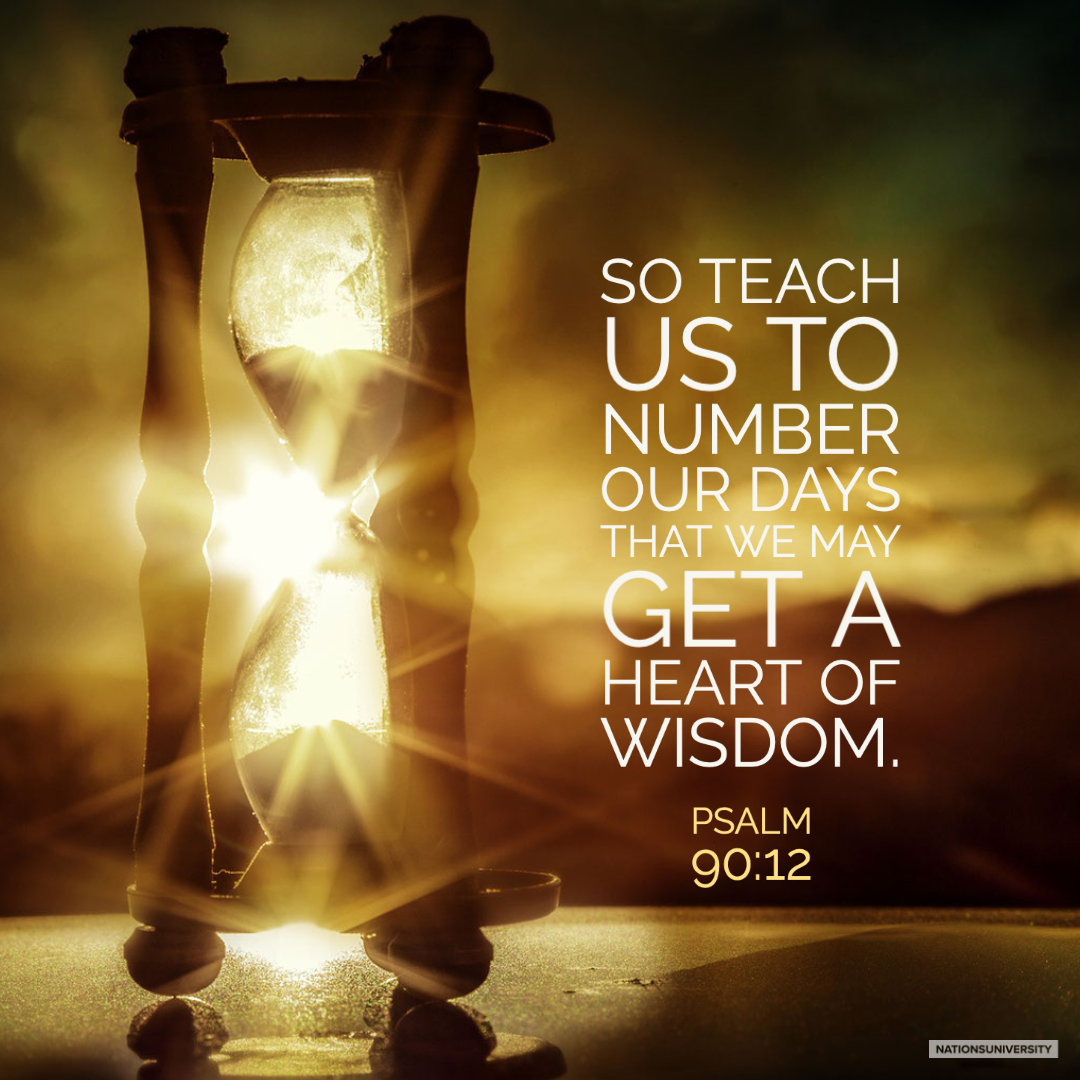
-------------------------------------------------------------------------------------------------

![]()
James Boice notes,
"But lest we get the idea that a shepherd is only some gentle, almost helpless soul doomed to care for sheep, the psalm reminds its that this wonderful shepherd of Israel is nevertheless also the God who sits "enthroned between the cherubim." This might refer to God's throne in heaven or to that earthly representation of it within the Most Holy Place of the tabernacle or temple. But whatever the case, it is a reminder of the majesty and power of the true God. In fact, it is on the basis of God's power that the psalm's appeal for salvation from Israel's enemies is made: "Awaken your might; come and save us" (Boice op. cit.).
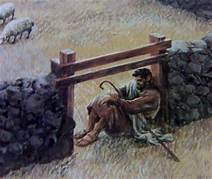
A prophetic passage in Micah speaks of Messiah as Israel's shepherd, and king--but this shepherd is also Yahweh. He is called "the Breaker," [i.e., the One who breaks open the sheepfold to lead his sheep to safety].
 [God speaking] "I will surely
gather all of you, O Jacob; I will surely bring together the remnant of Israel.
I will bring them together like sheep in a pen, like a flock in its pasture;
the place will throng with people ["in a great commotion"]. One who breaks
open the way [Hebrew: ha parats will go up before them; they will break
through the gate and go out. Their king will pass through before them, the LORD [Yahweh] at their head." (Micah 2:12-13).
[God speaking] "I will surely
gather all of you, O Jacob; I will surely bring together the remnant of Israel.
I will bring them together like sheep in a pen, like a flock in its pasture;
the place will throng with people ["in a great commotion"]. One who breaks
open the way [Hebrew: ha parats will go up before them; they will break
through the gate and go out. Their king will pass through before them, the LORD [Yahweh] at their head." (Micah 2:12-13).
(Parats is also translated Perez in the OT)
Taking other Scriptures into account, this passage most likely is speaking about of the remnant of Israel who will flee Jerusalem at the mid-point of the approaching tribulation period (See Matthew 24:19-22). The place of their refuge for three and a half years seems to be in Southern Jordon at Bozrah ["sheep-fold"] and/or at nearby Petra. It is there that the Shepherd of Israel will meet them, (Ezekiel 20-33-44). (See Israel's Coming Exile in Edom)
As Israel is overrun by foreign armies one last time (see Zechariah 12-14, Daniel 11:36ff), Jesus will lead the remnant of Israel back into their land from Bozrah/Petra in His role as a Greater Moses. Together they will come triumphantly to Jerusalem, arriving at the Mount of Olives in power and glory (Isaiah 63, Rev. 19:11-16). The sudden national conversion of Israel (Zech. 12) will be in time for Israel to rise up suddenly and defeat the armies of the nations assaulting them successfully against overwhelming odds, as Messiah slays Israel's false messiah and his European military-political ally (2 Thess. 2:3-12, Rev. 19:19-21). (Note 2)
After His return to earth, Jesus will gather the survivors of the nations to the Valley of Jehoshaphat just South of Jerusalem --and separate them there "as a shepherd divides his sheep from the goats." (Matthew 25)
Thus says the LORD, The Holy One of Israel, and his Maker: "Ask Me of things to come concerning My sons; And concerning the work of My hands, you command Me. I have made the earth, And created man on it. I--My hands--stretched out the heavens, And all their host I have commanded...Thus says the LORD: "The labor of Egypt and merchandise of Cush And of the Sabeans, men of stature, Shall come over to you, and they shall be yours; They shall walk behind you, They shall come over in chains; And they shall bow down to you. They will make supplication to you, saying, 'Surely God is in you, And there is no other; There is no other God.'" Truly You are God, who hide Yourself, O God of Israel, the Savior! They shall be ashamed And also disgraced, all of them; They shall go in confusion together, Who are makers of idols. But Israel shall be saved by the LORD With an everlasting salvation; You shall not be ashamed or disgraced Forever and ever.
For thus says the LORD, Who created the heavens, Who is God, Who formed the earth and made it, Who has established it, Who did not create it in vain, Who formed it to be inhabited: "I am the LORD, and there is no other. I have not spoken in secret, In a dark place of the earth; I did not say to the seed of Jacob, 'Seek Me in vain'; I, the LORD, speak righteousness, I declare things that are right. "Assemble yourselves and come; Draw near together, You who have escaped from the nations. They have no knowledge, Who carry the wood of their carved image, And pray to a god that cannot save. Tell and bring forth your case; Yes, let them take counsel together. Who has declared this from ancient time? Who has told it from that time? Have not I, the LORD?
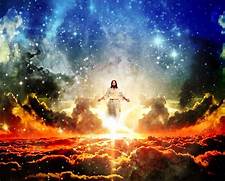
Historically, Sennacherib of Assyria overran the ten Northern tribes, destroying their capital of Samaria in 722 BC, and laying siege to Jerusalem (unsuccessfully) in 701. However, several Old Testament prophets use the term "the Assyrian" as a type of the final invasion of Israel from the North which opens up the campaign of Armageddon, for example,
"The LORD of hosts has sworn, saying, "Surely, as I have thought, so it shall come to pass, And as I have purposed, so it shall stand: That I will break the Assyrian in My land, And on My mountains tread him underfoot. Then his yoke shall be removed from them, And his burden removed from their shoulders. This is the purpose that is purposed against the whole earth, And this is the hand that is stretched out over all the nations. For the LORD of hosts has purposed, And who will annul it? His hand is stretched out, And who will turn it back?" (Isaiah 14:24-27) "Behold, the name of the LORD comes from afar, Burning with His anger, And His burden is heavy; His lips are full of indignation, And His tongue like a devouring fire. His breath is like an overflowing stream, Which reaches up to the neck, To sift the nations with the sieve of futility; And there shall be a bridle in the jaws of the people, Causing them to err. You shall have a song As in the night when a holy festival is kept, And gladness of heart as when one goes with a flute, To come into the mountain of the LORD, To the Mighty One of Israel. The LORD will cause His glorious voice to be heard, And show the descent of His arm, With the indignation of His anger And the flame of a devouring fire, With scattering, tempest, and hailstones. For through the voice of the LORD Assyria will be beaten down, As He strikes with the rod. And in every place where the staff of punishment passes, Which the LORD lays on him, It will be with tambourines and harps; And in battles of brandishing He will fight with it. For Tophet ["a burning place", Gehenna] was established of old, Yes, for the king it is prepared. He has made it deep and large; Its pyre is fire with much wood; The breath of the LORD, like a stream of brimstone, kindles it." (Isaiah 30:27-33)
Micah Chapter 5 is about Israel's Messiah and coming king. The return of Yeshua to our earth will be followed by a total purging of all idolatry from the earth.
"But you, Bethlehem Ephrathah, Though you are little among the thousands of Judah, Yet out of you shall come forth to Me The One to be Ruler in Israel, Whose goings forth are from of old, From everlasting."
When the Assyrian comes into our land, And when he treads in our palaces, Then we will raise against him Seven shepherds and eight princely men. They shall waste with the sword the land of Assyria, And the land of Nimrod at its entrances; Thus He shall deliver us from the Assyrian, When he comes into our land, And when he treads within our borders. Then the remnant of Jacob Shall be in the midst of many peoples, Like dew from the LORD, Like showers on the grass, That tarry for no man Nor wait for the sons of men. And the remnant of Jacob Shall be among the Gentiles, In the midst of many peoples, Like a lion among the beasts of the forest, Like a young lion among flocks of sheep, Who, if he passes through, Both treads down and tears in pieces, And none can deliver. Your hand shall be lifted against your adversaries, And all your enemies shall be cut off."
Therefore He shall give them up, Until the time that she who is in labor [Israel] has given birth; Then the remnant of His brethren Shall return to the children of Israel. And He [Messiah] shall stand and feed His flock In the strength of the LORD, In the majesty of the name of the LORD His God; And they shall abide, For now He shall be great To the ends of the earth; And this One shall be peace.
"And it shall be in that day," says the LORD, "That I will cut off your horses from your midst And destroy your chariots. I will cut off the cities of your land And throw down all your strongholds. I will cut off sorceries from your hand, And you shall have no soothsayers. Your carved images I will also cut off, And your sacred pillars from your midst; You shall no more worship the work of your hands; I will pluck your wooden images from your midst; Thus I will destroy your cities. And I will execute vengeance in anger and fury on the nations that have not obeyed."
"But as for me, [Micah] I watch in hope for the LORD, I wait for God my Saviour; my God will hear me. Do not gloat over me, my enemy! Though I have fallen, I will rise. Though I sit in darkness, the LORD will be my light. Because I have sinned against him, [Micah identifying with the remnant of Israel] I will bear the LORD's wrath, until he pleads my case and establishes my right. He will bring me out into the light; I will see his righteousness. Then my enemy will see it and will be covered with shame, she who said to me, "Where is the LORD your God?" My eyes will see her downfall; even now she will be trampled underfoot like mire in the streets. The day for building your walls will come, the day for extending your boundaries.
In that day people will come to you from Assyria and the cities of Egypt, even from Egypt to the Euphrates and from sea to sea and from mountain to mountain. The earth [the entire earth] will become desolate because of its inhabitants, as the result of their deeds.
[Micah's prayer] Shepherd your people with your staff, the flock of your inheritance, which lives by itself in a forest, in fertile pasture-lands. Let them feed in Bashan and Gilead as in days long ago. "As in the days when you came out of Egypt, I will show them my wonders." Nations [all nations] will see and be ashamed, deprived of all their power. They will lay their hands on their mouths and their ears will become deaf. They will lick dust like a snake, like creatures that crawl on the ground. They will come trembling out of their dens; they will turn in fear to the LORD our God and will be afraid of you [Israel].
Who is a God like you, who pardons sin and forgives the transgression of the remnant of his inheritance? You do not stay angry for ever but delight to show mercy. You will again have compassion on us; you will tread our sins underfoot and hurl all our iniquities into the depths of the sea. You will be true to Jacob, and show mercy to Abraham, as you pledged on oath to our fathers in days long ago." (Micah 7:7-20)
One should also note Ezekiel Chapter 34 which speaks of a future day when Israel's true Shepherd will judge that nation's false shepherds and take personal responsibility for the care of His people Israel:
And the word of the LORD came to me, saying, "Son of man, prophesy against the shepherds of Israel, prophesy and say to them, 'Thus says the Lord GOD to the shepherds: "Woe to the shepherds of Israel who feed themselves! Should not the shepherds feed the flocks? "You eat the fat and clothe yourselves with the wool; you slaughter the fatlings, but you do not feed the flock. "The weak you have not strengthened, nor have you healed those who were sick, nor bound up the broken, nor brought back what was driven away, nor sought what was lost; but with force and cruelty you have ruled them. "So they were scattered because there was no shepherd; and they became food for all the beasts of the field when they were scattered. "My sheep wandered through all the mountains, and on every high hill; yes, My flock was scattered over the whole face of the earth, and no one was seeking or searching for them."Isaiah also notes the Messiah will come back to Israel as a shepherd comes to care for his sheep:'Therefore, you shepherds, hear the word of the LORD: "as I live," says the Lord GOD, "surely because My flock became a prey, and My flock became food for every beast of the field, because there was no shepherd, nor did My shepherds search for My flock, but the shepherds fed themselves and did not feed My flock"-- 'therefore, O shepherds, hear the word of the LORD! 'Thus says the Lord GOD: "Behold, I am against the shepherds, and I will require My flock at their hand; I will cause them to cease feeding the sheep, and the shepherds shall feed themselves no more; for I will deliver My flock from their mouths, that they may no longer be food for them."
'For thus says the Lord GOD: "Indeed I Myself will search for My sheep and seek them out. "As a shepherd seeks out his flock on the day he is among his scattered sheep, so will I seek out My sheep and deliver them from all the places where they were scattered on a cloudy and dark day. "And I will bring them out from the peoples and gather them from the countries, and will bring them to their own land; I will feed them on the mountains of Israel, in the valleys and in all the inhabited places of the country. "I will feed them in good pasture, and their fold shall be on the high mountains of Israel. There they shall lie down in a good fold and feed in rich pasture on the mountains of Israel. "I will feed My flock, and I will make them lie down," says the Lord GOD. "I will seek what was lost and bring back what was driven away, bind up the broken and strengthen what was sick; but I will destroy the fat and the strong, and feed them in judgment."
'And as for you, O My flock, thus says the Lord GOD: "Behold, I shall judge between sheep and sheep, between rams and goats. "Is it too little for you to have eaten up the good pasture, that you must tread down with your feet the residue of your pasture--and to have drunk of the clear waters, that you must foul the residue with your feet? "And as for My flock, they eat what you have trampled with your feet, and they drink what you have fouled with your feet." 'Therefore thus says the Lord GOD to them: "Behold, I Myself will judge between the fat and the lean sheep. "Because you have pushed with side and shoulder, butted all the weak ones with your horns, and scattered them abroad, "therefore I will save My flock, and they shall no longer be a prey; and I will judge between sheep and sheep. "I will establish one shepherd over them, and he shall feed them--My servant David. He shall feed them and be their shepherd. "And I, the LORD, will be their God, and My servant David a prince among them; I, the LORD, have spoken.
"I will make a covenant of peace with them, and cause wild beasts to cease from the land; and they will dwell safely in the wilderness and sleep in the woods. "I will make them and the places all around My hill a blessing; and I will cause showers to come down in their season; there shall be showers of blessing. "Then the trees of the field shall yield their fruit, and the earth shall yield her increase. They shall be safe in their land; and they shall know that I am the LORD, when I have broken the bands of their yoke and delivered them from the hand of those who enslaved them. "And they shall no longer be a prey for the nations, nor shall beasts of the land devour them; but they shall dwell safely, and no one shall make them afraid. "I will raise up for them a garden of renown, and they shall no longer be consumed with hunger in the land, nor bear the shame of the Gentiles anymore. "Thus they shall know that I, the LORD their God, am with them, and they, the house of Israel, are My people," says the Lord GOD.'" "You are My flock, the flock of My pasture; you are men, and I am your God," says the Lord GOD. (NKJV)
"Behold, the Lord GOD shall come with a strong hand, And His arm shall rule for Him; Behold, His reward is with Him, And His work before Him. He will feed His flock like a shepherd; He will gather the lambs with His arm, And carry them in His bosom, And gently lead those who are with young." (Isaiah 40:10-11 NKJV)
The benediction which closes the New Testament letter to the Hebrews brings full circle the picture of Israel's true shepherd, Yeshua, who is also the Shepherd of the church, and our Great High Priest.
"Now may the God of peace who brought up our Lord Jesus from the dead, that great Shepherd of the sheep, through the blood of the everlasting covenant, make you complete in every good work to do His will, working in you what is well pleasing in His sight, through Jesus Christ, to whom be glory forever and ever. Amen." (Hebrews 13:20-21)
Ray Stedman connects the Shepherd of Israel with the Great High Priest over the church in summing up the great benediction at the end of the Letter to the Hebrews,
"Verses 20-21 must rank among the most powerfully worded blessings found in the Scripture. They gather up the passionate concern of the writer for his readers' spiritual growth and stress the major factors that make such growth possible: the God of peace, the blood of the eternal covenant, the resurrection of Jesus, his Shepherd care for his sheep, the indwelling life of God himself, the equipping of the Spirit, the aim to please God, and the eternal glory and lordship of Jesus. It is all there in one glorious outpouring of good wishes and confident certainty. [F.F.] Bruce sees it as a kind of collect (a gathered-together prayer) which later became popular in the Latin churches. These are the themes of Hebrews brilliantly restated and forming an appropriate conclusion to the letter. The God of peace is surely a reference to the peace given to all who are justified by faith (Romans 5:1); the blood of the eternal covenant recalls all the writer has said in chapters 8-10 about the opening of a new and living way to God; brought back from the dead our Lord Jesus, though the only direct reference to the resurrection in the epistle, implies the new beginning and the new power which is now shared with all who believe; that great Shepherd of the sheep pictures the high priestly ministry of Jesus under a different figure; equip you with everything good speaks of the spiritual gifts imparted by the Spirit, mentioned in 2:4; working in us what is pleasing to him looks back to 13:15-16, the worship and service of God's people; and through Jesus Christ, to whom be glory for ever and ever concludes with the pre-eminent theme of the entire letter: the superiority of Jesus to anything and everything else that men worship or honor. With such marvelous resources as these, who can excuse any failure to become the man or woman God intends you to be? We may well adopt for our own the words of J. I. Packer: "My task is not to dizzy myself by introspecting or speculating to find (if I can) what lies at the outer reaches of consciousness, nor to pursue endless, exquisite stimulation in the hope of new exotic ecstasies. It is, rather, to know and keep my place in God's cosmic hierarchy, and in that place to spend my strength in serving God and men."
The Shepherd-King of Israel is coming back soon! "Even so, Come Lord Jesus."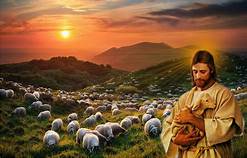
Notes:
1.The figure of the vineyard speaks of Israel's national history, the olive tree of Israel's spiritual history, and the fig tree as symbolic of her religious history. See Arthur Custance, Three Trees And Israel's History
2. Israel's coming false Messiah is cryptically and prophetically described in Zechariah.
And the LORD said to me, "Next, take for yourself the implements of a foolish shepherd. "For indeed I will raise up a shepherd in the land who will not care for those who are cut off, nor seek the young, nor heal those that are broken, nor feed those that still stand. But he will eat the flesh of the fat and tear their hooves in pieces. "Woe to the worthless shepherd, Who leaves the flock! A sword shall be against his arm And against his right eye; His arm shall completely wither, And his right eye shall be totally blinded." (11:15-17)


Lambert Dolphin's Main Library
Email is welcome: Lambert Dolphin
Archive for Newsletters
Library Annex (700+ new articles since 2018. Free, help thyself)

---------------------------------------------

| The Temple Mount in Jerusalem: (http://templemount.org)
For more information on the Temple Mount in Jerusalem, research concerning the location of the First and Second Temples and recent developments there see our separate web site. Maps and history of Jerusalem are brought up to date with MP3 lectures by leading scholars and research papers concerning the location of the Jewish Temples and plans for a Third Temple. Developed with the help of Mike Kollen, Jim Milligan and Tuvia Sagiv. |
 |

January 9, 2008
December 29, 2018
July 24, 2019
April 25, 2021
March 26, , 2023